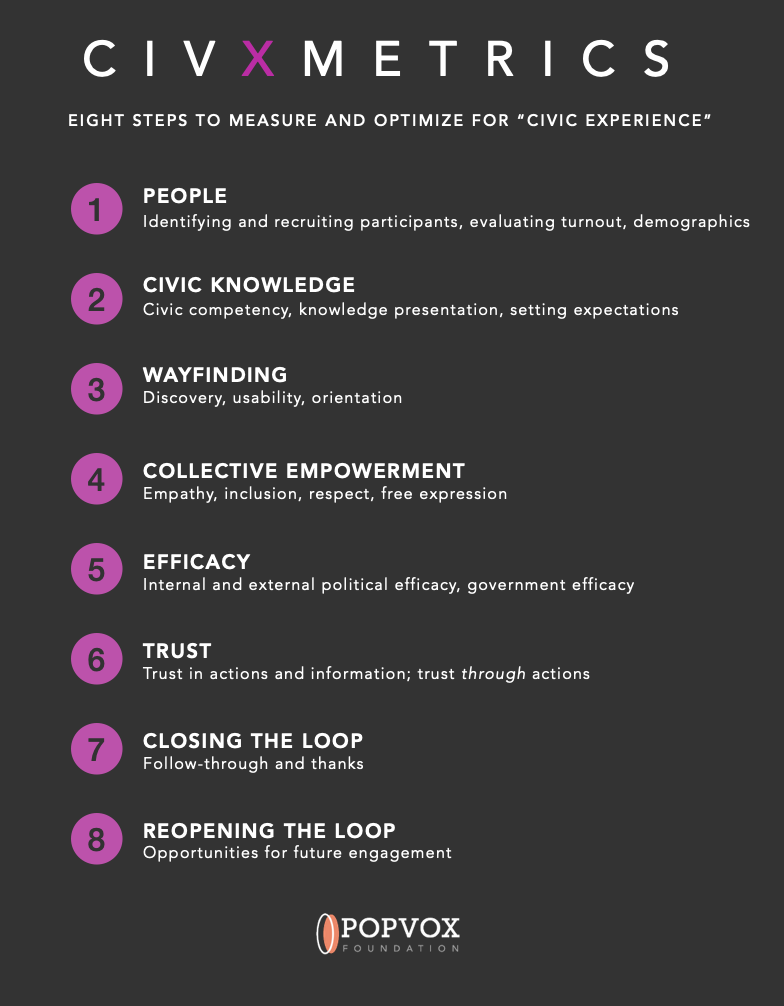Measuring Civic Experience
Led by researcher Samantha McDonald, Ph.D., the POPVOX Foundation is working to develop an open source “Civic Experience Metrics” that can be used as an apples-to-apples metric for future government or civil society projects.
The CivX Metrics Toolkit
A set of straightforward and universal metrics to evaluate the civic experience to make it easier for governing institutions to adopt a CivX framework and raise the floor for civic experience across governing institutions.
Why “CivX”?
Organizations use various metrics to evaluate the “experience” of individuals who engage with their services. Since the 1990s, the public sector has increasingly adopted practices developed in the commercial context to evaluate “customer experience” or “CX,” focusing on the ease, efficiency, and effectiveness of transactional services and the satisfaction that individuals feel with those transactions.
“A ‘CivX’ approach views people not simply as customers who need to be satisfied within the context of a single interaction or service, but as contributors with power and agency over institutions that affect their everyday lives and the lives of others within their communities.”
However, the concept of “citizen as customer,” misses key characteristics of engagement by “the People” in a democracy. Individuals engaging with their government are not simply customers — they are partners, stakeholders, citizens, investors, and so much more. Depending on the context, people interact with government to vindicate rights, guide the direction of their communities, and to protect and preserve their livelihoods. These interactions are not just transactional but transformational. Traditional CX metrics alone are insufficient to measure the complexity of those experiences.
We believe that the strides made over the past several decades in introducing CX concepts and methods for measuring the “experience” of those interacting with government provide a solid foundation for what could become an expanded practice of assessing and optimizing for the needs of members of historically or currently underserved communities.
This toolkit introduces the concept of “Civic Experience” or “CivX” metrics that incorporate values like civic empowerment, equity, efficacy, and inclusion. A “CivX” approach views people not simply as customers who need to be satisfied within the context of a single interaction or service but as contributors with power and agency over institutions that affect their everyday lives and the lives of others within their communities.
The CivX approach invites agencies to consider interactions between individuals and government not in isolation but as part of a larger experience of the individual in one of their many “roles” — as constituent, customer, partner, citizen, and more.
We believe that a set of relatively straightforward and universal metrics to evaluate the civic experience can make it easier for governing institutions to adopt a CivX framework and raise the floor for civic experience across governing institutions.
We recognize that these metrics are not all-encompassing and encourage active feedback on this toolkit. It is intended as a living, changing document that will continuously evolve to meet the needs of the civic and governing community. Please share your feedback!
RESEARCHER:
Samantha McDonald
Samantha is a Ph.D. candidate at the University of California, Irvine in the Donald Bren School of Information and Computer Sciences. Her research interests are in human-computer interaction, representative democracy, and civic tech. She loves to think about the ethical, political, and cultural implications of designing systems for civic engagement.



